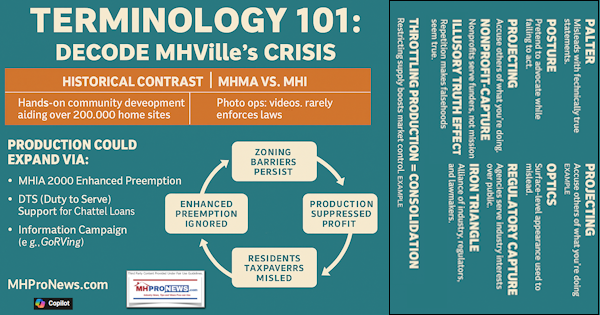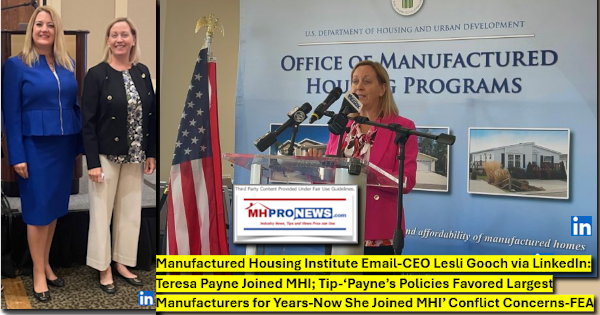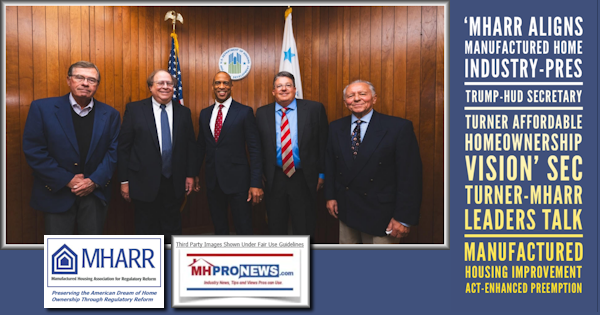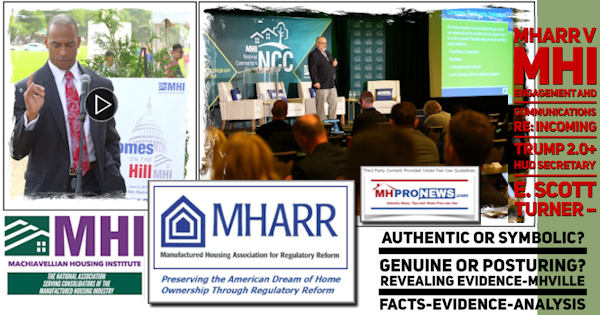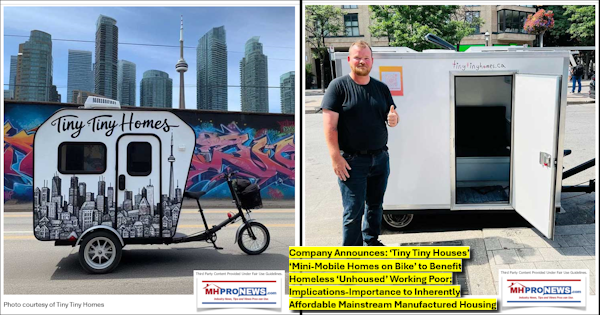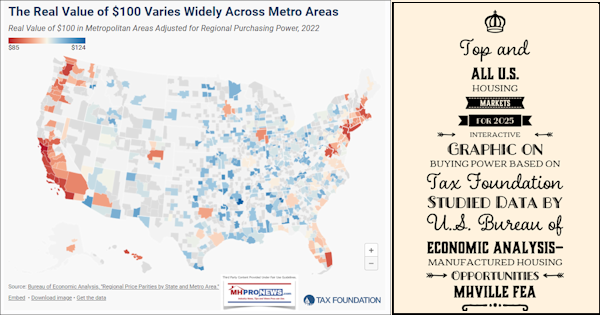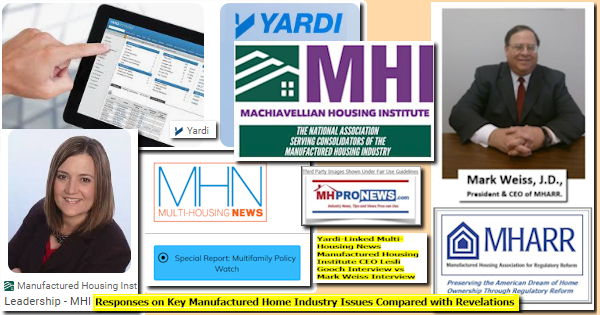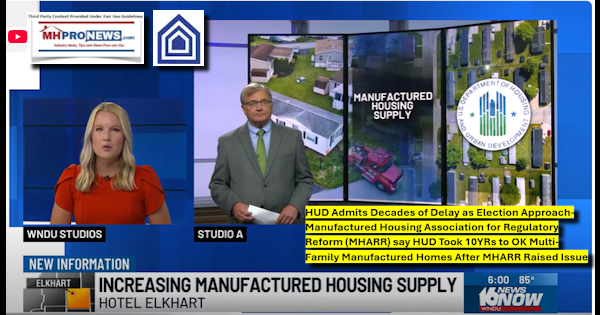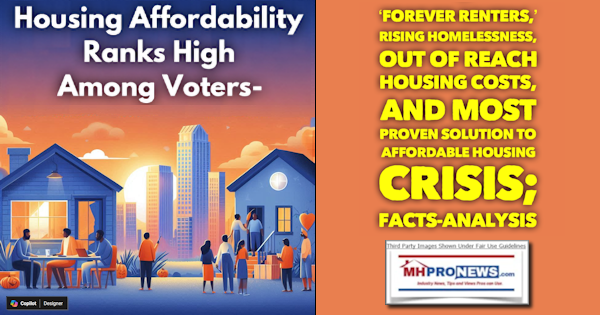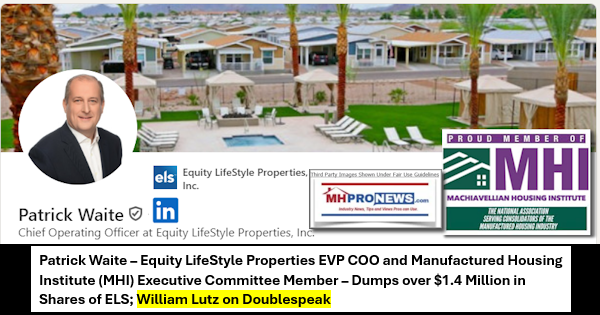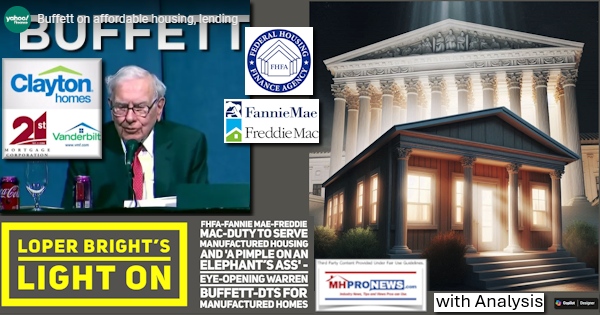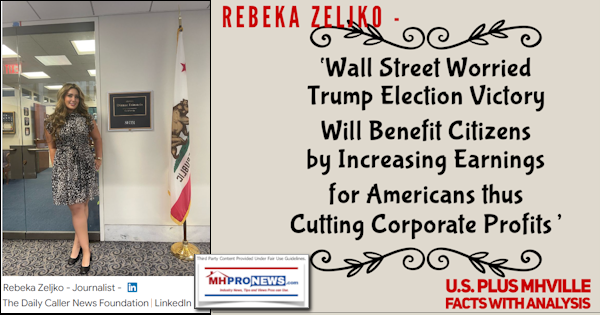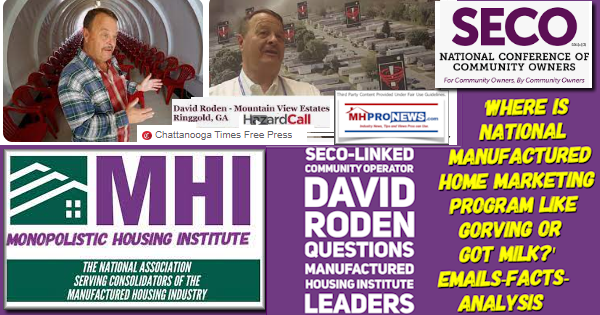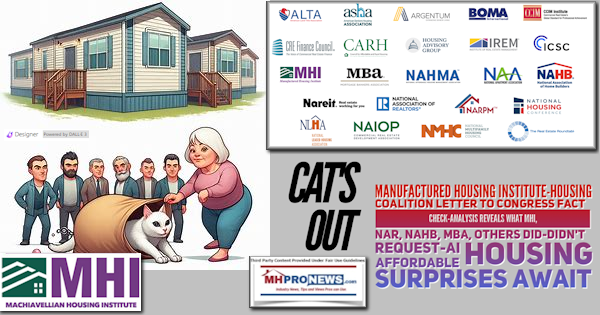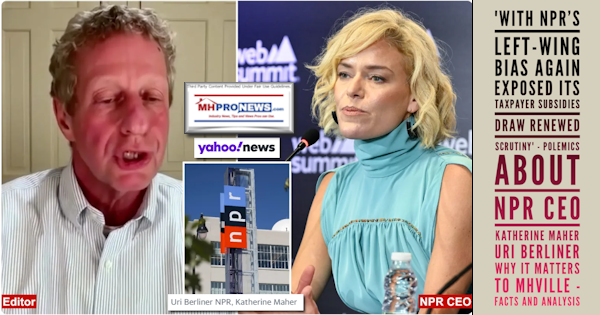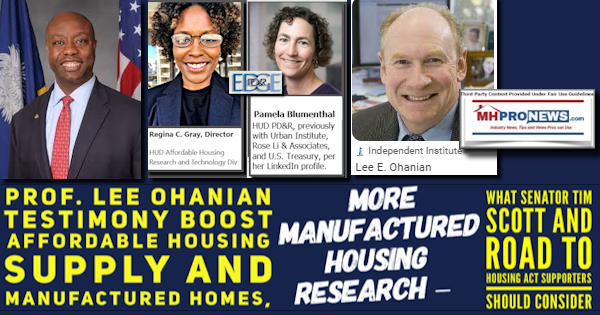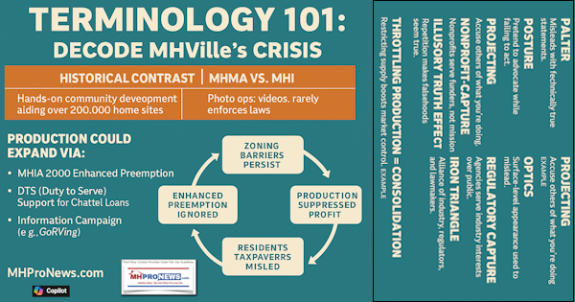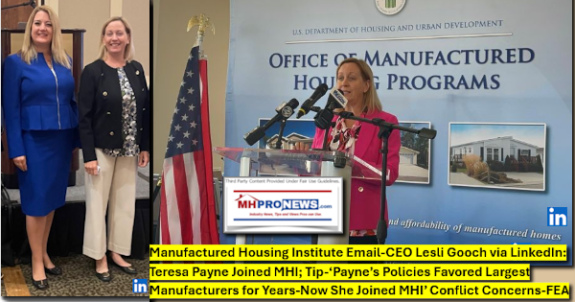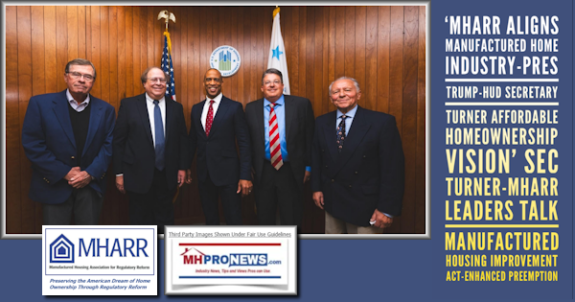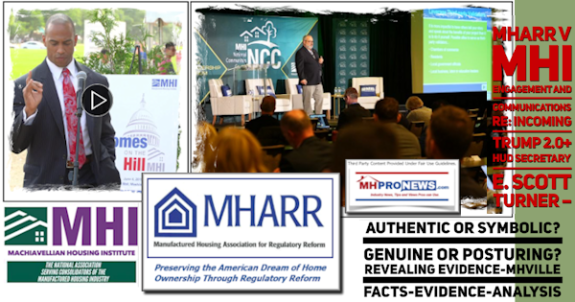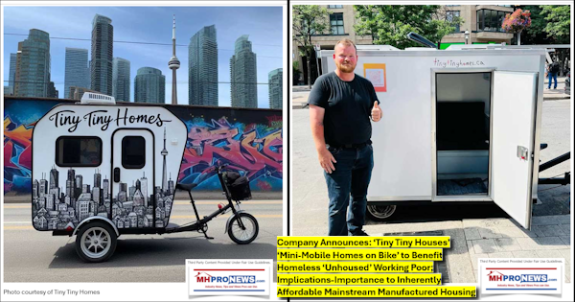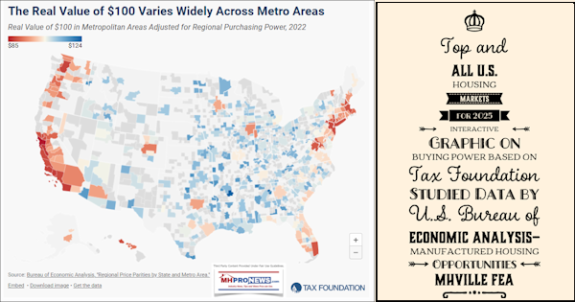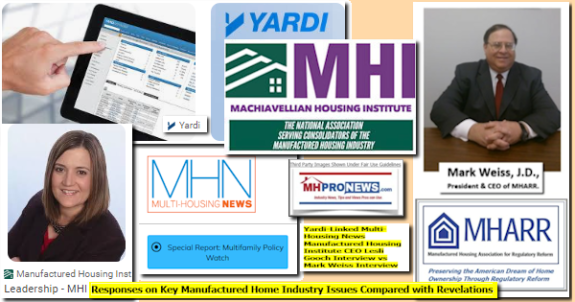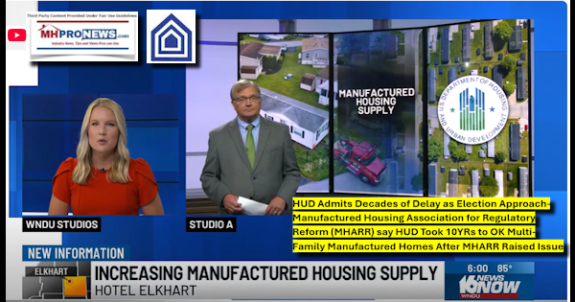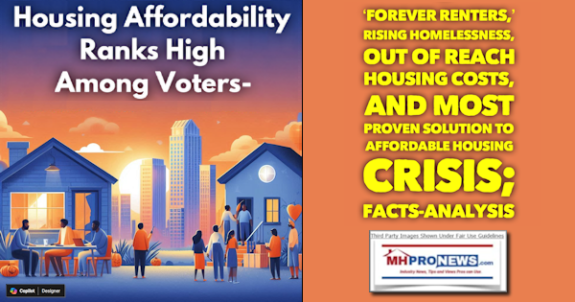In “Opportunities to Increase Housing Production and Preservation” HUD’s Pamela Blumenthal Regina Gray said: “The regulatory environment — federal, state, and local — that contributes to the extensive mismatch between supply and need has worsened over time. Federally sponsored commissions, task forces, and councils under both Democratic and Republican administrations have examined the effects of land use regulations on affordable housing for more than 50 years.” That link is to a document entitled “Not in My Back Yard [NIMBY] Removing Barriers to Affordable Housing.” It mentioned the phrase “manufactured home” six (6) times, per a Word search of that 168-page report. “Manufactured housing” was mentioned 38 times in the federally commissioned research. On 7.20.2022 Professor Lee E. Ohanian delivered testimony to the U.S. Senate Finance Committee. The text of his remarks – Policy Proposals to Increase Housing Affordability – run six (6) pages and Ohanian used the phrase “manufactured home” six (6) times and “manufactured housing” a dozen times. Ohanian’s written testimony referenced the work of James A. “Jim” Schmitz Jr. and his research colleagues five (5) times.
Specifically noted by Professor Ohanian to the U.S. Senate was Schmitz and his Minneapolis Federal Reserve colleagues work in 2020 is a document entitled: “Solving the Housing Crisis will Require Fighting Monopolies in Construction.” There we can find the phrase “sabotaging monopolies.”
A Google search of – “sabotaging monopolies” James Schmitz – on 6.20.2023 yielded 11 results. The top two of those search results are on the Minneapolis Federal Reserve website. No link mentioning Schmitz and his colleagues work on the “sabotaging” of manufactured housing are found on the Manufactured Housing Institute (MHI) website. No references to “sabotaging monopolies” and Schmitz are identified by Google as being on a website of a blogger or publication that is a member of MHI.
Senator Tim Scott (SC-R) has a positive story to share. Scott is a declared presidential candidate for the Republican nomination in 2024. He appears to be pro-manufactured housing, which is no surprise, since his state has one of the highest percentages of mobile and manufactured homes in the nation. Senator Scott wrote a helpful and supportive letter to Department of Energy (DOE) Secretary Jennifer Granholm on behalf of manufactured housing seeking a stay in those regulations that the industry has agreed is harmful. Restated, he put some level of action behind his words.
Examples of Senator Scott in His Own Words
Federal housing programs are meant to transition Americans out of poverty – not trap them in it. It’s time to rethink how we build opportunity.
My ROAD to Housing Act will make the dream of an affordable place to call home a reality for families across our nation. pic.twitter.com/soV2iqZwgM
— Tim Scott (@SenatorTimScott) April 27, 2023
Though longer, the interview that follows blows away the number of views of the two campaign videos combined.
While many business professionals are familiar with Opportunity Zones, that Senator Scott championed, and perhaps more Americans know the bipartisan First Step Act for criminal justice reform, perhaps nothing would be more important for millions than delivering on more affordable housing for people of all backgrounds, particularly those Americans with low and modest incomes.
Realities, Observations, and Respectful Suggestions to Senator Tim Scott
Every federal lawmaker, and thousands more at the state level, lean on staff for much of their activities.
For better and for worse, lobbyists and trade groups are also part of the mix of what goes into the legislative process. Media plays a role, as does academic and other research. These are realities that U.S. Senator Tim Scott from South Carolina, along with all other federal lawmakers, know quite well.
Much of Senator Scott’s message is about optimism and opportunities. Scott’s faith is stressed, and certainly the Hebrew (Old Testament) and explicitly Christian (New Testament) biblical books are numerous references to fighting for justice, to defend the rights of the poor from being defrauded or harmed, and prohibitions against lying and deception. Scott’s foundational positions on faith, optimism and opportunity are to be commended.
Indeed, the ROAD to Housing Act includes an acronym that builds on that theme: “Renewing Opportunity in the American Dream (ROAD) to Housing Act.” Implicit in the proposal is a suggestion that millions are effectively barred from affordable home ownership. As the bill draft states as the aim of the legislation: “To increase access to affordable housing, reduce regulatory barriers, increase oversight, and assist the most vulnerable.” Hold those thoughts, as we will return to them.
There are different kinds of legislation. Some pieces of legislation are announced knowing that a bill will never be enacted into law, at least, not during a time when an opposing party holds power. Other legislation legitimately aims to gain bipartisan support, which for years has been a key to getting a bill through a closely divided Congress and onto a presidential desk to be signed into law.
What may be useful, or even imperative, in his ROAD to Housing Act – and for his campaign – are a demonstration of his willingness to do what Ohanian, Schmitz, Samuel “Sam” Strommen, and others have said is necessary. Namely, a clearly declared willingness to take on the monopolistic forces that are “sabotaging” the U.S. Housing market.
The Bureaucracy
Equally important is a willingness to take on what has been called “the permanent bureaucracy,” “the Deep State” and other less generous terms, such as “the Washington, D.C. Swamp.” It isn’t that there is no evidence that Scott has tackled those topics. But the evidence may not rise to the level one might think necessary to successfully fight what Schmitz, Strommen, and others indicate is necessary. Time will tell.
The Iron Triangle and the Revolving Door
For those who hope and pray for authentic progress on serious problems facing America, there may be good news from a political and policy standpoint. Polling seems to suggest that a growing number of citizens have become aware of the problems of the permanent and unelected bureaucracy.
For example, a left-leaning ABC News/Washington Post poll in 4.27.2017 said: “Nearly half of Americans think there’s a ‘deep state.’”
Less than a year later 3.19.2018), an article on left-leaning Vox said the following.
“Is the government secretly being controlled by an unelected group of officials — a so-called “deep state”? The majority of the country seems to think so, according to a Monmouth University poll released Monday.
Once thought of as the domain of conspiracy theorists (and, later, the president of the United States), the perception of unelected officials having undue influence has gone mainstream. Seventy-four percent of poll respondents said the deep state, “a group of unelected government and military officials who secretly manipulate or direct national policy,” “definitely” or “probably” exists.
Only 37 percent of Americans said they were at least “somewhat familiar” with the term “deep state.” However, given the description, 27 percent said the deep state definitely exists and 47 percent said it probably exists.”
The arguably related terms “Iron Triangle” and “Revolving Door” may not have yet achieved household discussion status. That said, the polling cited suggests that the intellectual foundation for a ‘deep state’ style of casual collusion – i.e.: the Iron Triangle and Revolving Door – that has long existed between advocates, lobbyists, public officials, and lawmakers could be broached by bold candidates. Hold those thoughts.
For those not yet in that terminology loop, left-leaning Wikipedia describes the Iron Triangle like this.
 In United States politics, the “iron triangle” comprises the policy-making relationship among the congressional committees, the bureaucracy, and interest groups,[2] as described in 1981 by Gordon Adams.[3][4] Earlier mentions of this ‘iron triangle’ concept are in a 1956 Congressional Quarterly Weekly Report as, “Iron triangle: Clout, background, and outlook” and “Chinks in the Iron Triangle?”[5]”
In United States politics, the “iron triangle” comprises the policy-making relationship among the congressional committees, the bureaucracy, and interest groups,[2] as described in 1981 by Gordon Adams.[3][4] Earlier mentions of this ‘iron triangle’ concept are in a 1956 Congressional Quarterly Weekly Report as, “Iron triangle: Clout, background, and outlook” and “Chinks in the Iron Triangle?”[5]”
Open Secrets, the National Conference of State Legislatures, and Investopedia are among the top results on Google for: revolving door in government. Per Investopedia: “A revolving door is the movement of high-level employees from public-sector jobs to private sector jobs and vice versa.” Once more, hold those thoughts for later.
Pivoting back to Blumenthal and Gray’s research on barriers to more affordable housing: “Numerous studies find land use regulations that limit the number of new units that can be built or impose significant costs on development through fees and long approval processes drive up housing costs. Research indicates higher housing costs also drive up program costs for federal assistance, reducing the funds available to serve additional households.” While the two colleagues never explicitly mentioned manufactured housing, their including the “Not in My Back Yard: Removing Barriers to Affordable Housing” research which cited manufactured homes numerous times suggests they appear to be at least aware of the importance of manufactured housing. The irony is that HUD is the primary federal regulator of HUD Code manufactured homes. Yet Blumenthal and Gray, working for HUD, did not specifically mention manufactured housing?
Prior HUD Secretary Ben Carson, M.D., was an apparent proponent of manufactured housing. While HUD Secretaries, past and present, have mentioned manufactured housing – perhaps out of politeness or good politics – when the topic is raised or when those in the audience tend to need to hear those words. In contrast to that, former Sec. Carson spoke about manufactured homes when it was, and when it wasn’t expected, as the linked examples reflect.
Dr. Carson’s remarks posted on the HUD website on 5.7.2019 said: “HUD’s mission is to ensure all Americans have access to safe, quality, and affordable housing. And we believe that manufactured housing has a promising role to play – especially in the area of quality affordable housing. For that reason, one year ago, I announced that HUD was in position to usher in a “new era of cooperation and collaboration between our Department and the manufactured housing industry.””
Having read several times how Schmitz and his colleagues’ assert with evidence that HUD and the National Association of Home Builders (NAHB) were part of the problem of “sabotaging monopolies,” Dr. Carson’s remarks take on a fascinating light. The primary regulator – HUD – had its prior secretary – Dr. Ben Carson – during the more pro-business, pro-housing Trump Administration take a stance that seemed to acknowledge that HUD in the past been less than supportive of manufactured housing. Why else would Carson have said: “that HUD was in position to usher in a “new era of cooperation and collaboration between our Department and the manufactured housing industry.”” Regardless of party labels, thoughtful individuals who care about solutions more than partisanship should lean in and want to learn more. That is a role that Senator Scott could champion. More on that shortly.
If the Manufactured Housing Association for Regulatory Reform (MHARR) is known for a certain thing, they could be summed up something like this.
- MHARR wants to see existing federal laws that on paper are supportive of manufactured housing to be fully and properly implemented. On paper, MHI does too, as the example linked here Note that this goes to the heart of what the ROAD to Housing Act, Senator Scott and others say they hope the act would achieve; quoting the draft’s goal for the ROAD again: “To increase access to affordable housing, reduce regulatory barriers, increase oversight, and assist the most vulnerable.”
- MHARR has challenged MHI with posturing support for existing federal laws, but then failing to do what is necessary and logical for supposed benefits to “reach the ground” (be of practical use) for manufactured housing consumers and professionals if they actually want that support to advance.
- By name and implication, MHARR has repeatedly said that MHI is failing to get the job done in the post-production sector of the industry. Note that MHI is an umbrella-style trade group that has both manufactured home production and post-production firms as members. MHARR is made up of independent producers of manufactured homes along with some affiliates who support their mission.
- MHI is several times larger than MHARR. But MHARR has used facts, evidence, the law and information to spotlight what is and is not occurring in Washington, D.C. With information, they have at times caused MHI to do what they ought to want to do if they actually meant what they said about representing “all segments” of the manufactured home industry.
If MHARR were alone in those concerns about MHI and federal regulators, they might be easily dismissed as an outlier. But MHARR’s decades in the trenches of Washington are directly and indirectly supported by researchers such a Schmitz, his colleagues, Strommen, and others. Furthermore, some past and current MHI members have expressed concerns that align with MHARR’s, Strommen’s and others’ allegations against MHI. Restated, there is evidence from within the ranks for MHI, from MHARR, and from outside analysts and researchers too.
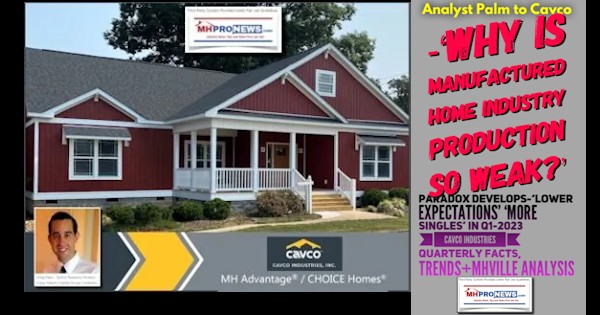
Why the Elements Above are Keys to Advancing Affordable Housing Crisis Solutions and Manufactured Housing’s Role in Those Solutions
Prof. Ohanian was arguably correct in citing Schmitz et al as part of his testimony to the Senate Finance Committee as part of his advocacy for more manufactured housing as a key part of the solution for more affordable housing. Let's briefly look more closely at what Ohanian said. The bold in the title of Schmitz's research is added by the Masthead on MHProNews.
- "America’s housing crisis is nearly 100 years old, dating back to the 1920s when the average home price in Manhattan was over $1.2 million in inflation-adjusted dollars2. In the last century, dozens, and perhaps hundreds of federal, state, and local agencies have been created to deliver affordable housing, but affordability remains elusive, particularly for low and middle-income households."
- "Increasing housing affordability requires addressing two related issues. We must expand housing supply and we must build new housing at a much lower cost."
- "I focus on two areas for policy responses: (1) increasing the use of manufactured housing, which is much more cost efficient than traditionally built housing..."
- "Summary: Manufactured housing is 60 percent less expensive to build per square than traditionally built housing, but regulations and financing difficulties have significantly hampered adoption of these homes. ..."
- "But modern production methods are notably absent from our residential construction industry, which builds homes in much the same way as they have always been built, as described in an important recent study of manufactured housing by James A. Schmitz, an economist at the Federal Reserve Bank of Minneapolis[1]. This means that residential construction costs are much higher than they could be." [1] Schmitz, James A. Jr., 2020, “Solving the Housing Crisis will Require Fighting Monopolies in Construction”, Federal Reserve Bank of Minneapolis Working Paper No. 773.
Schmitz and his colleagues' thesis focuses on the NAHB and HUD as key players in hobbling HUD Code manufactured homes. The chart below is by MHProNews, but uses as its base document an illustration from MHI member Skyline Champion homes.
Notice: the graphic below can be expanded to a larger size.
See the instructions below the graphic below or click the image and follow the prompts.
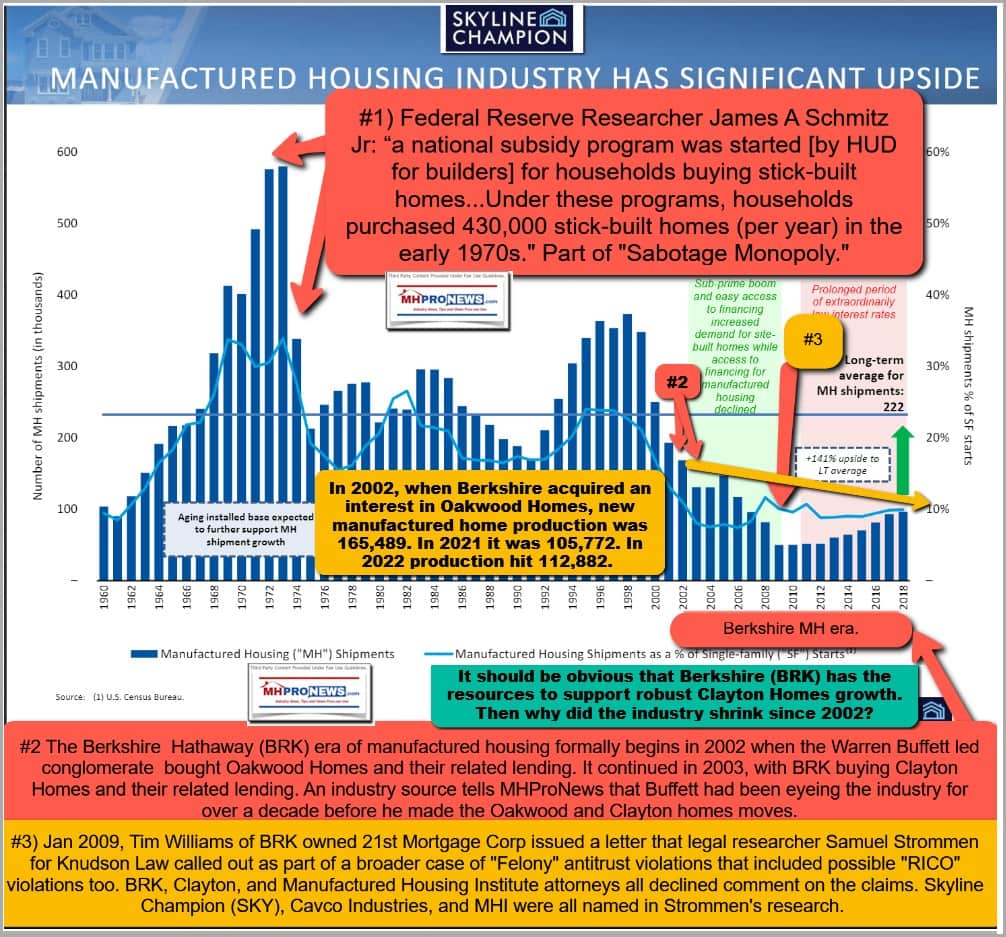
Schmitz and his colleagues are blunt on certain points.
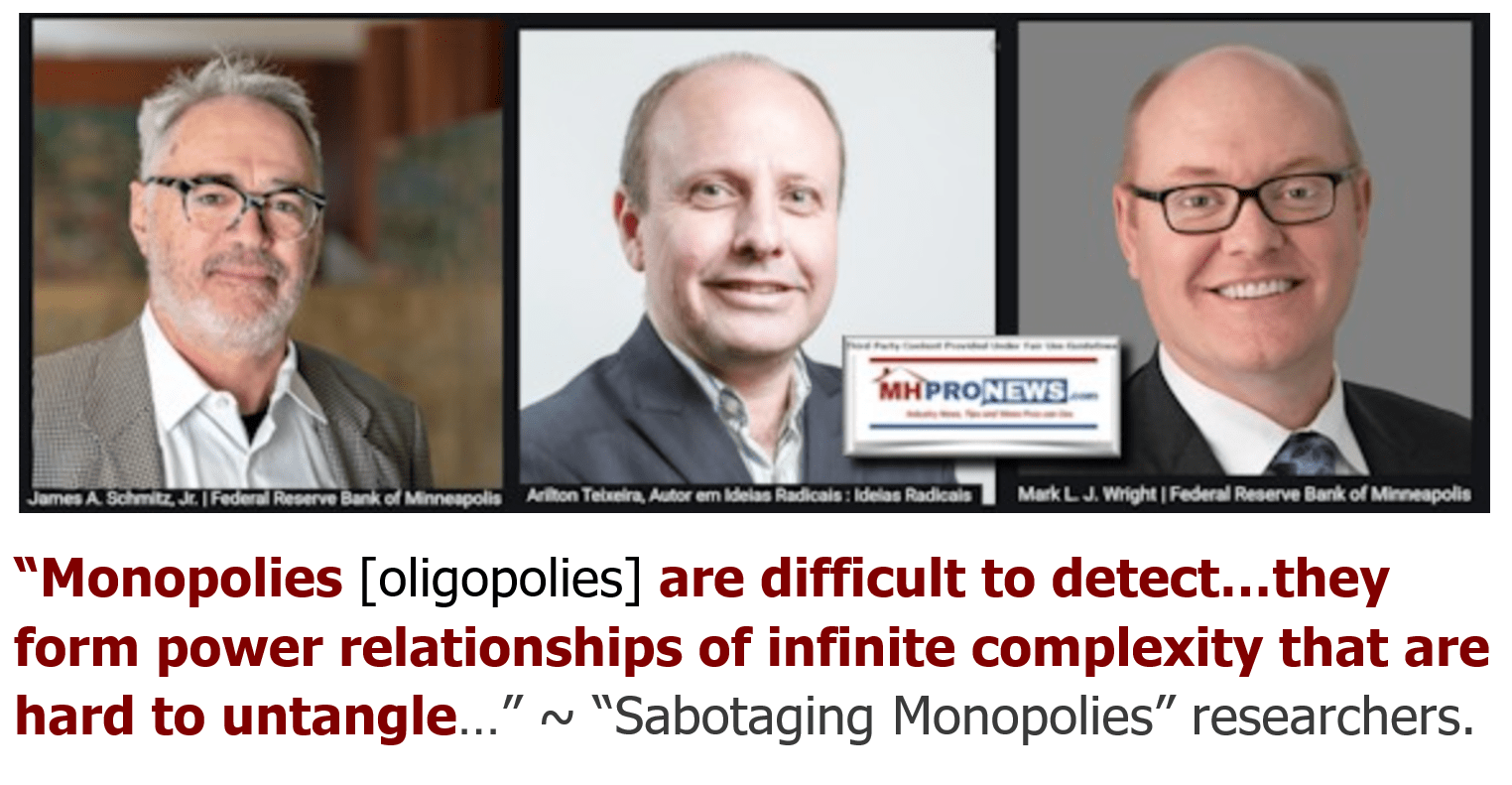
Notice: the graphic below can be expanded to a larger size.
See the instructions below the graphic below or click the image and follow the prompts.
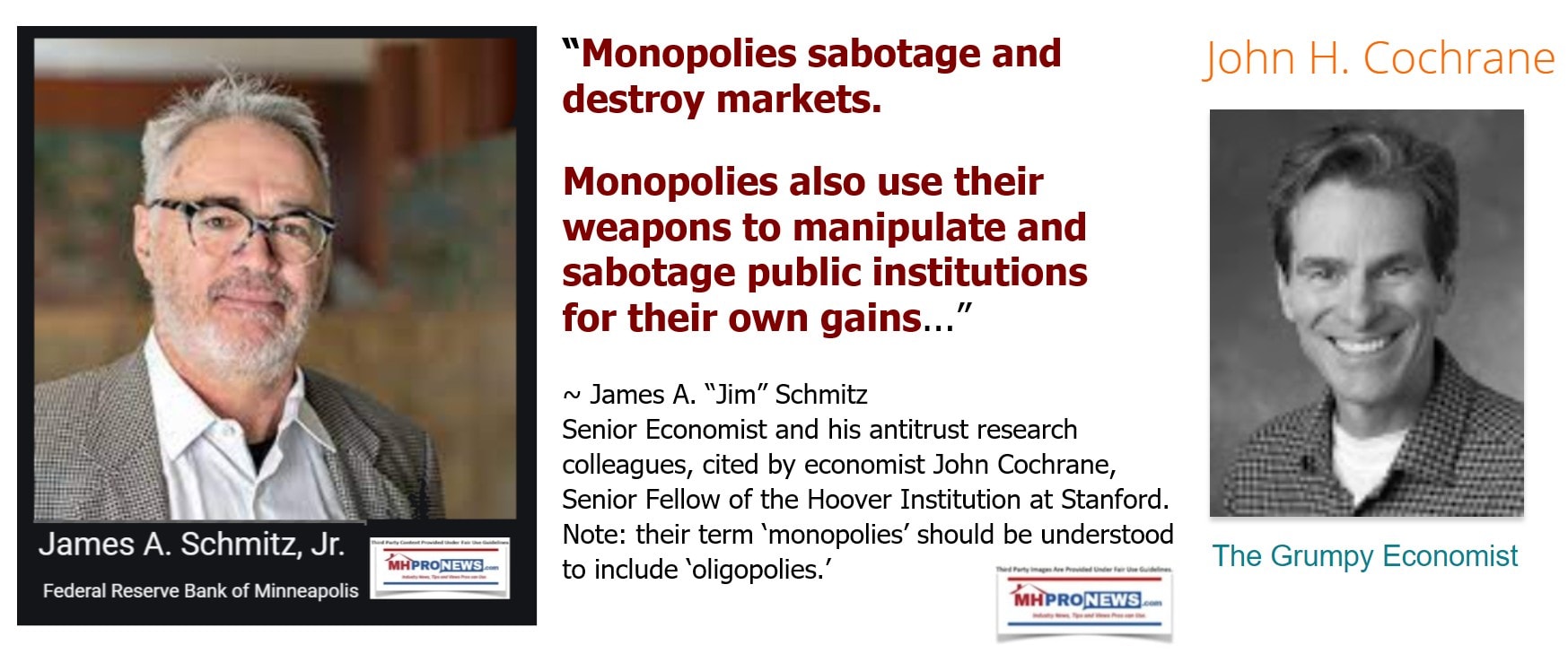
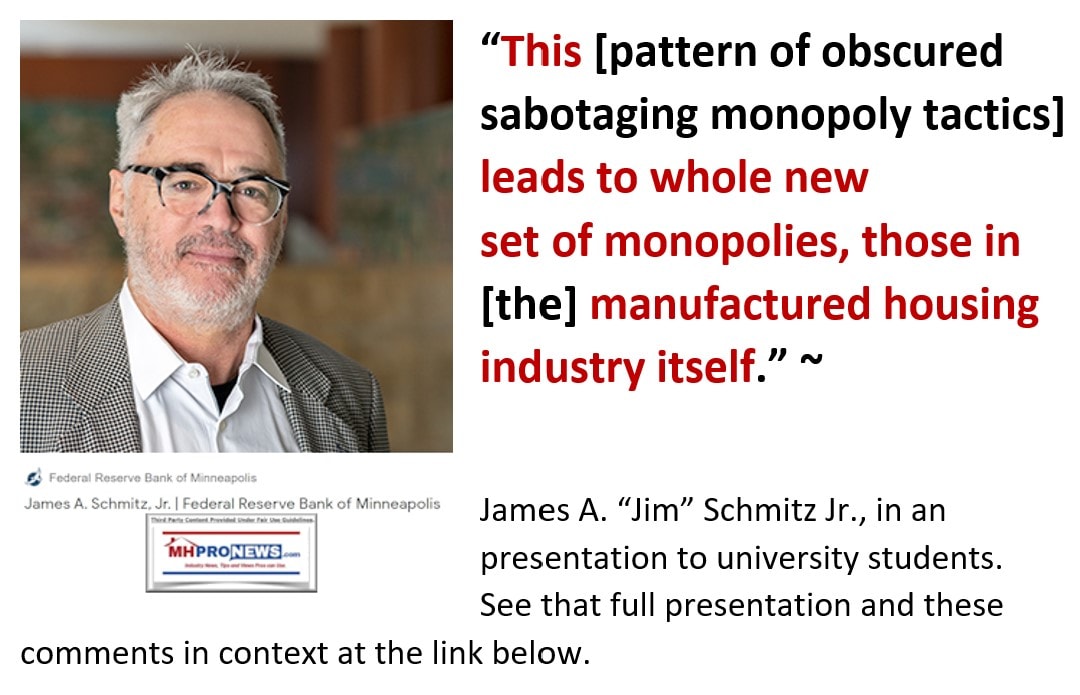
MHI has an antitrust statement. MHI also has a "Code of Ethical Conduct." But there are no known examples of MHI invoking either one. MHI's corporate and staff leaders have been given numerous opportunities to respond to the mounting evidence against them and their key members. They have routinely ducked, dodged, deflected or proverbially ran from public accountability.
A decade ago, these notions may have been deemed conspiracy theories and would have been readily dismissed. But as a growing array of research from sources like those mentioned leads the objective thinker to conclude that manufactured housing has been subverted from outside and within.
But that leads to a reasonable question. Why would manufactured home industry firms in MHI work to limit their own industry? Where is the motivation for them to do so? The answer comes in good measure from two MHI members.
No Title
No Description
No Title
No Description
The underperformance of manufactured housing acts as a barrier of entry and persistence for competitors. See the report linked above and the one linked here.
If Senator Scott wants to increase the supply of affordable housing, there is a dire need for rigorous formal investigations followed by antitrust, RICO and other forms of law enforcement. Who says? Schmitz, his colleagues, Samuel Strommen, and others who have studied these issues for some time. Ironically, several MHI brands that publish investor relations information flatly admit that they are focused on consolidating the manufactured home industry. As the late Sam Zell said over a decade ago, he likes the oligopoly nature of the manufactured home industry. That's akin to an in your face challenge for antitrust enforcement to occur. The antitrust allegations and evidence mount, but where are the antitrust enforcers?
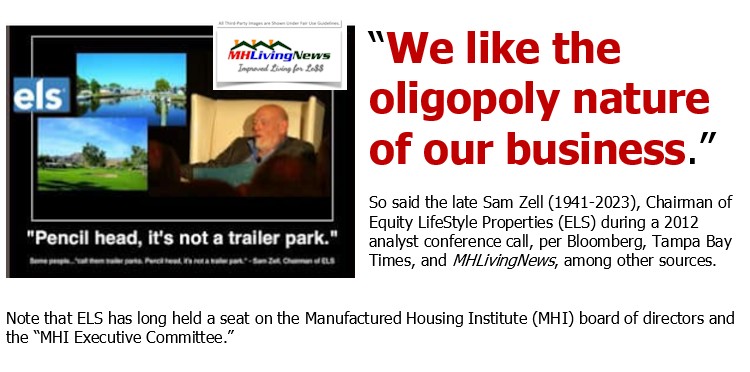
Then, if Senator Scott wants to get more manufactured homes to be used, as he and so many others have argued is necessary, then there is a need to press the "enhanced preemption" provision of the Manufactured Housing Improvement Act of 20000 (MHIA).
Notice: the graphic below can be expanded to a larger size.
See the instructions below the graphic below or click the image and follow the prompts.
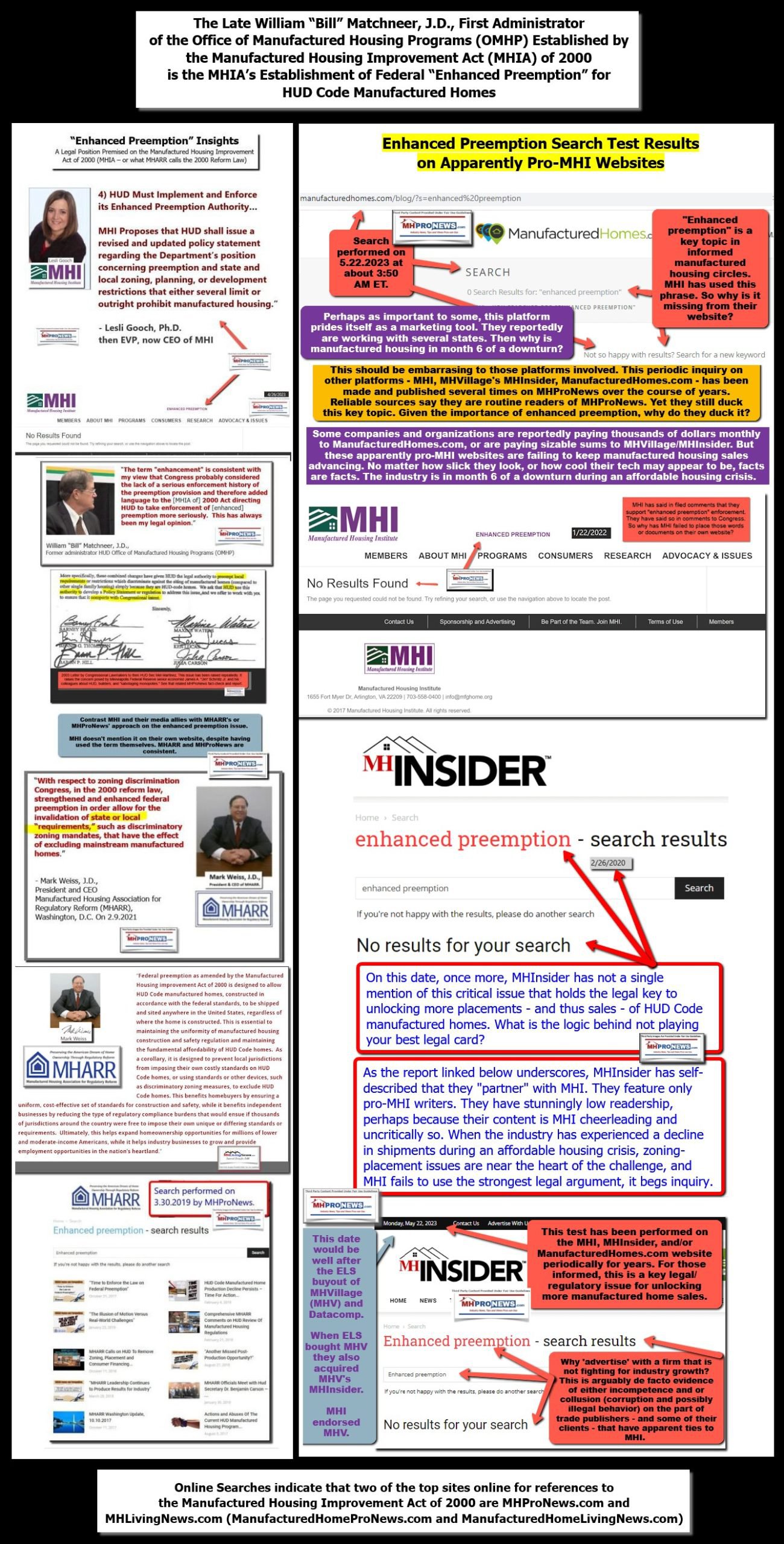
The case could be made that if members of Congress, like Senator Scott, just called for hearings on these issues, a series of swift efforts might result that would magically result in more manufactured housing production. But until that happens, apparent market manipulation seems to be occurring in plain sight for those with the eyes to see.
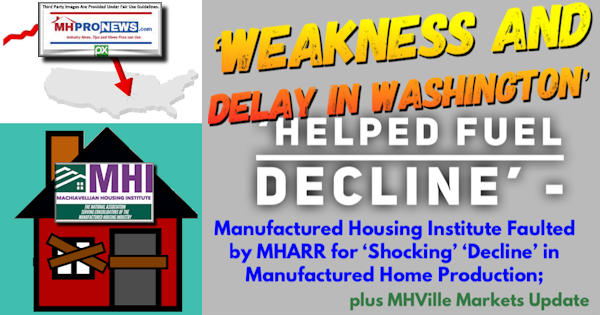
There is always more to know. But the evidence presented and linked ought to be enough for motivated and thoughtful people to investigate and act. See the ROAD Act report and others linked here and herein to learn more about why manufactured housing is underperforming during an affordable housing crisis. Good intentions have and can be hijacked. ###
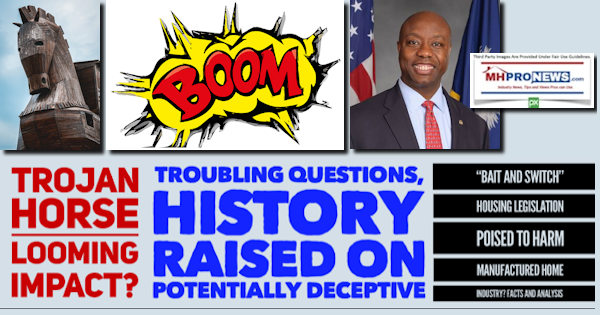
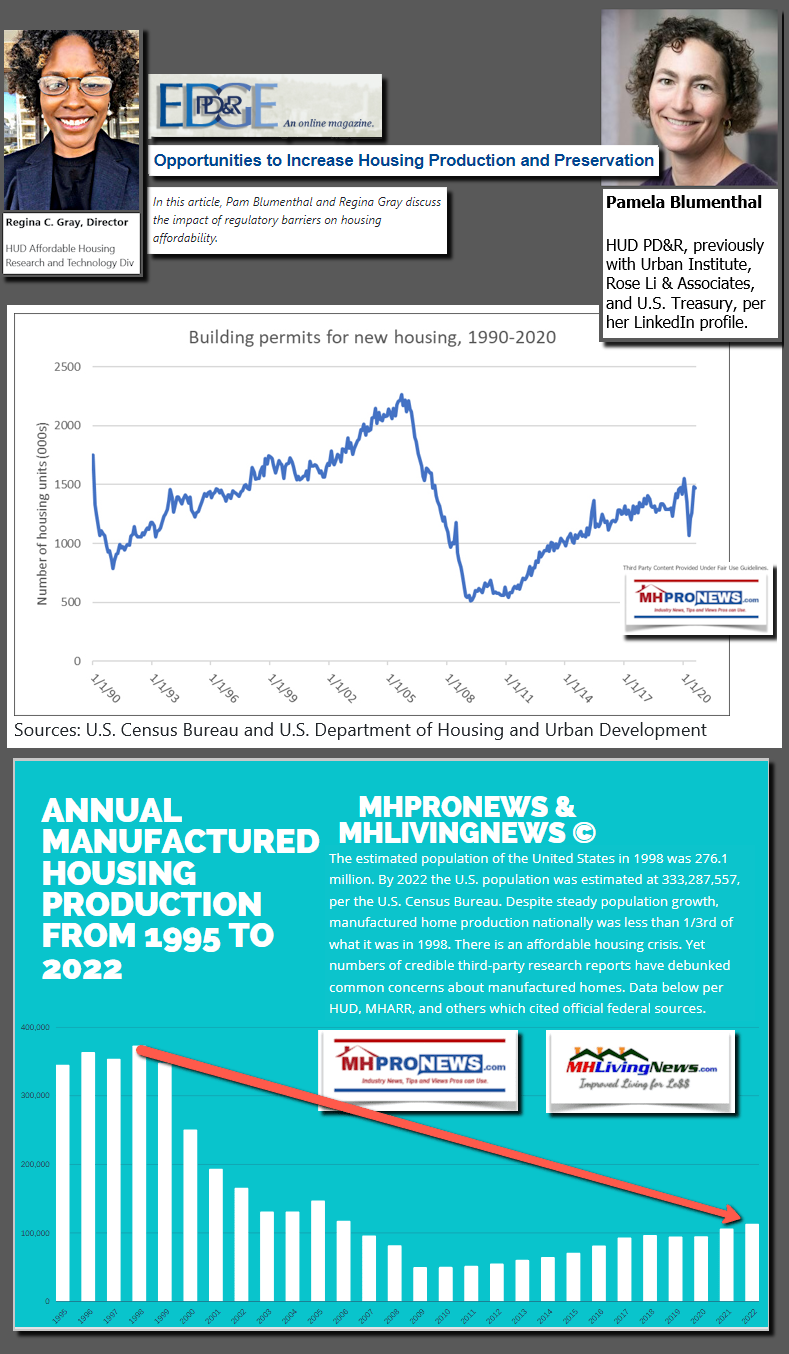
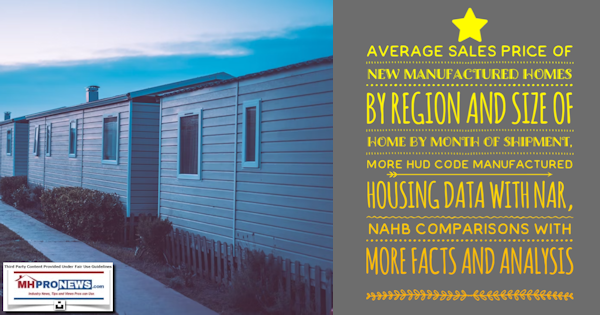
PS: The remarks below and linked here were delivered at the FHFA listening session on 3.25.2023 by this writer. MHI spoke at that same session. Each evidence-based remark or claim is routinely hot-linked so that the facts and reasoning are easily accessible to all who seek the truth about why manufactured housing is underperforming in the 21st century.
No Title
No Description
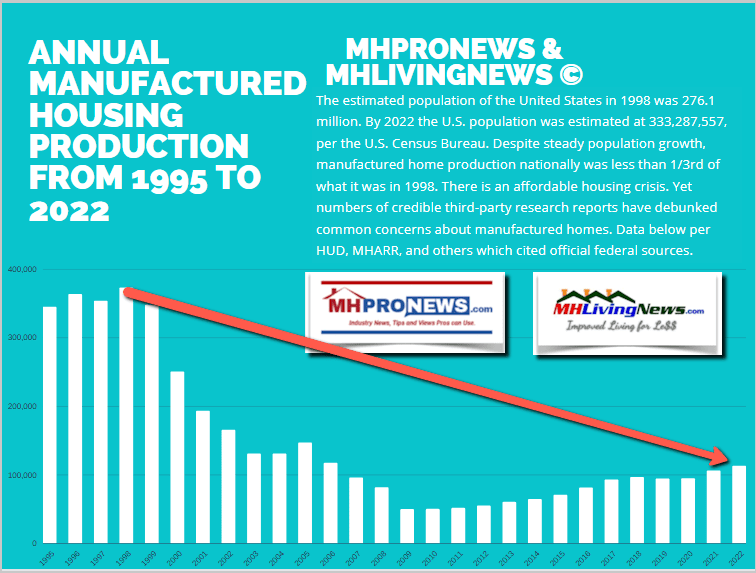
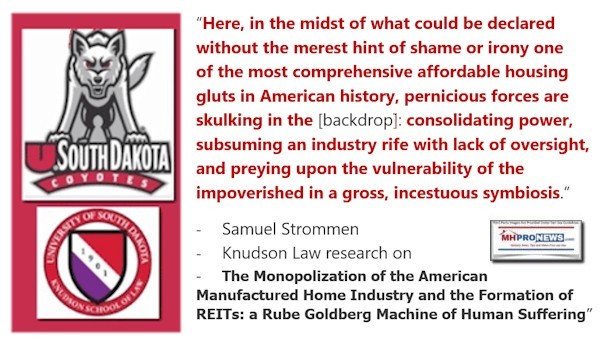
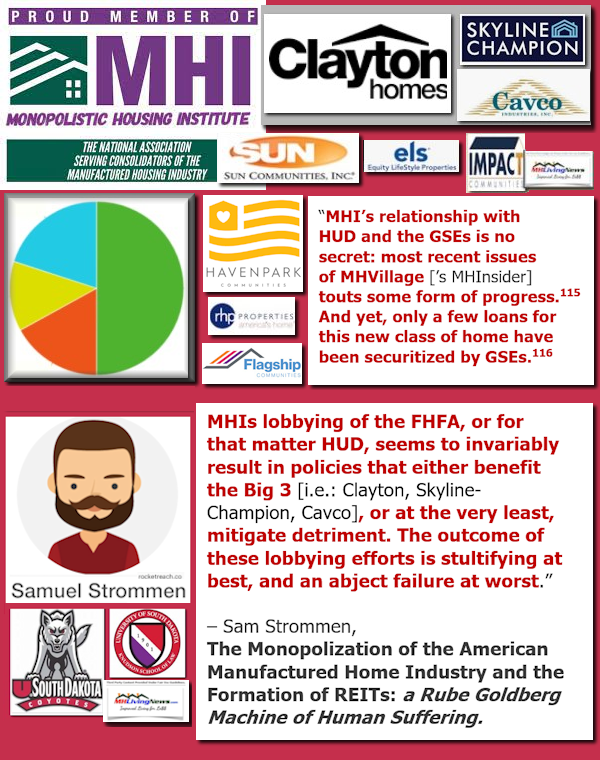

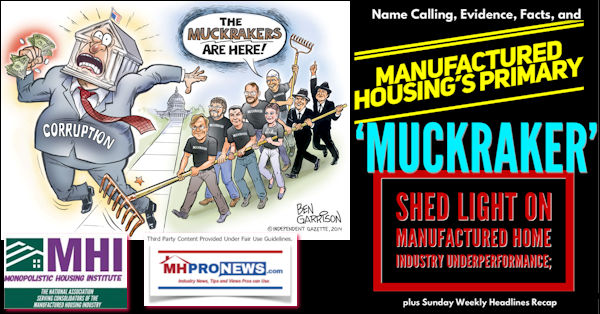
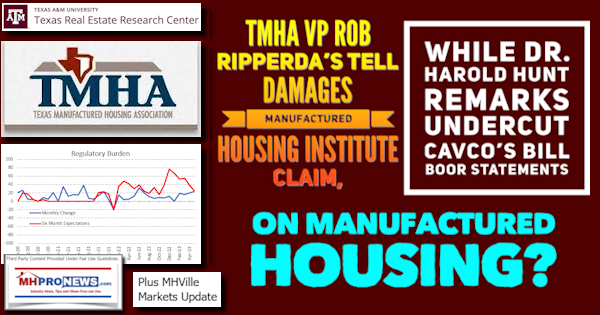


[cp_popup display="inline" style_id="139941" step_id = "1"][/cp_popup]
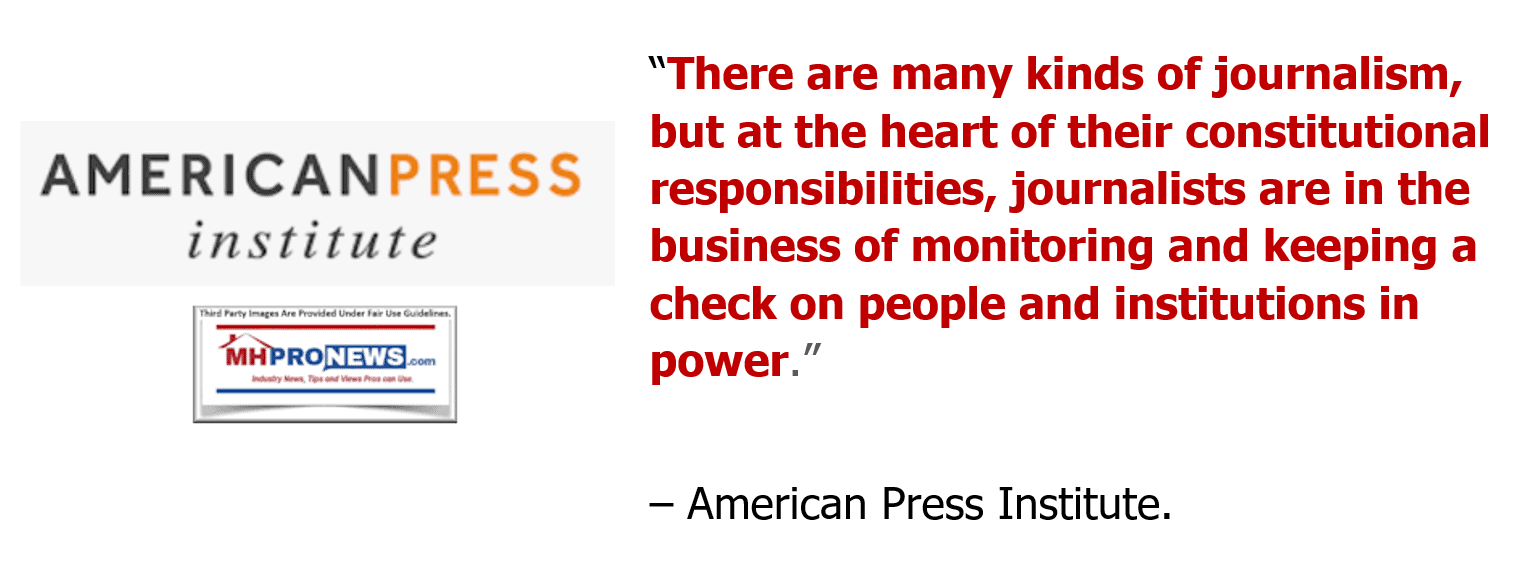
Stay tuned for more of what is 'behind the curtains' as well as what is obvious and in your face reporting that are not found anywhere else in MHVille. It is all here, which may explain why this is the runaway largest and most-read source for authentic manufactured home “News through the lens of manufactured homes and factory-built housing” © where “We Provide, You Decide.” © ## (Affordable housing, manufactured homes, reports, fact-checks, analysis, and commentary. Third-party images or content are provided under fair use guidelines for media.) (See Related Reports, further below. Text/image boxes often are hot-linked to other reports that can be access by clicking on them.)

By L.A. "Tony" Kovach - for MHProNews.com.
Tony earned a journalism scholarship and earned numerous awards in history and in manufactured housing.
For example, he earned the prestigious Lottinville Award in history from the University of Oklahoma, where he studied history and business management. He's a managing member and co-founder of LifeStyle Factory Homes, LLC, the parent company to MHProNews, and MHLivingNews.com.
This article reflects the LLC's and/or the writer's position, and may or may not reflect the views of sponsors or supporters.
Connect on LinkedIn: http://www.linkedin.com/in/latonykovach
Related References:
The text/image boxes below are linked to other reports, which can be accessed by clicking on them.


